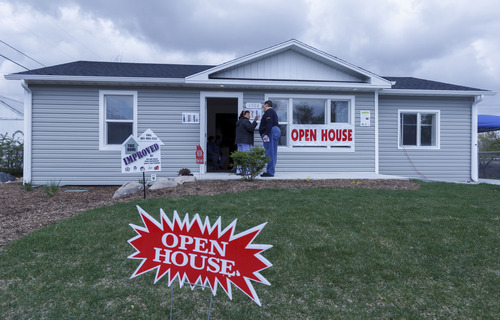This is an archived article that was published on sltrib.com in 2012, and information in the article may be outdated. It is provided only for personal research purposes and may not be reprinted.
Utah has once again been named an economic superstar.
The state's three major metro areas rank among the 20 top communities nationwide in terms of the strength of their economic recoveries, according to a Brookings Institution report released Wednesday.
The Salt Lake City metro area's rebound is rated the 13th strongest of 100 areas nationwide, according to Brookings Mountain West, a joint project of the Washington, D.C.-based think tank and the University of Nevada at Las Vegas. Provo-Orem is 12th best and Ogden-Clearfield 19th.
The report is based on data for the first quarter of the year. Much of Utah's high metro rankings are tied to the comparative health of the employment market, both in terms of job growth and unemployment rate.
" Utah's been a bit of a star performer," in the nation's economic recovery, said Kenan Fikri, policy analyst with the Brooking Institution.
Over the past two years, Utah's metro areas have been consistently experiencing slow but steady job growth, meaning more jobs have been added to the economy than have been lost. In fact, Fikri, notes, Utah has recovered most of the jobs lost since 2008.
In the West as a whole, employment growth accelerated in the January-March period, led by Utah's metro areas, Denver and Phoenix.
Along with Utah's growth in jobs, the unemployment rate has been steadily falling for two years in the metros.
Utah's biggest cities also have seen improvement in housing, a key sector that has been hampering the national recovery.
According to the report, Salt Lake, Ogden-Clearfield and Provo-Orem Utah's are in the top 10 in terms of the housing recovery. But it's not because home prices are increasing.
"Even in Utah, home prices fell in the first quarter of 2012 — they just fell less in Utah's metro areas than most of the rest of the country," Fikri said.
Most economists predict housing prices along the Wasatch Front will stabilize by the end of the year. That's more good news, considering the housing sector plays such a large role in the health of a community's economy.
Although the report is upbeat about Utah's economic performance, the job market in Utah's most populous areas remains tough, said Mark Knold, chief economist with the Utah Department of Workforce Services. Many people still are struggling to find a job lost during the recession, while others remain underemployed or are earning less than they did in good economic times. In addition, roughly 25,000 people have entered the labor force, and jobs have not been created for all of them.
"Our pace of recovery is better than most of the rest of the country," Knold said. "I don't mean to downplay the growth we do have because it's very good. ... But we still have a long way to go."
Although not every metro area in the West is doing as well as Utah's trio, in terms of economic recovery the West still is the place to be, according to the Brookings report.
"While there is definite variation, the region continued its steady recovery in the early months of the year," said Mark Muro, a senior fellow and the policy director of the Metro Program at Brookings and the Washington co-director of Brookings Mountain West. "While there is definite variation, the region continued its steady recovery in the early months of the year."
Twitter: @cheapchick
Facebook: Facebook.com/OneCheapChick —
The West is best
Among 100 metro areas nationwide, some of the nation's strongest recoveries are in the West. Cities that are ranked in the top 20 areas with the biggest rebound from the Great Recession:
Phoenix-Mesa-Glendale, Ariz. 5th
Boise-Nampa, Idaho 6th
San Jose-Sunnyvale-Santa Clara, Calif. 9th
Provo-Orem, 12th
Salt Lake City, 13th
Portland-Vancouver-Hillsboro, Ore./Wash. 17th
Ogden-Clearfield, 19th
Source: Brookings Institution



